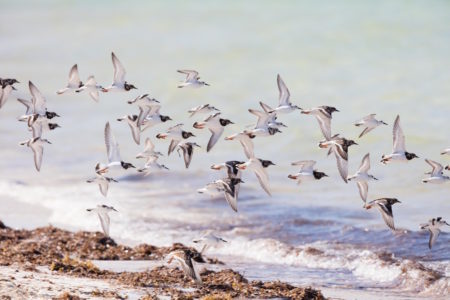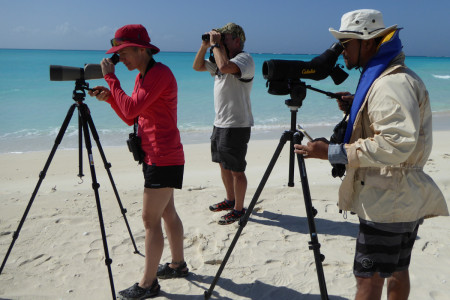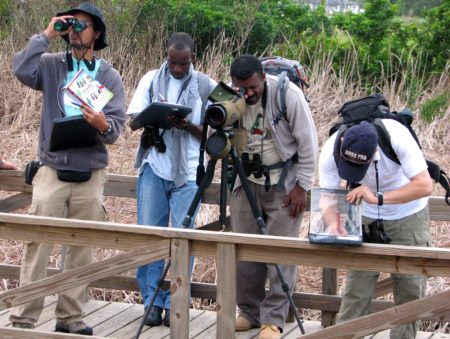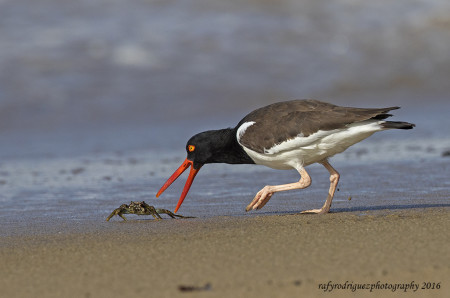
BirdsCaribbean and Manomet, working with their partners are pleased to invite interested persons to participate in a five-day international training workshop entitled, “Conserving Caribbean Shorebirds and their Habitats.” This comprehensive workshop will cover shorebird identification, monitoring techniques, and shorebird ecology and conservation issues. The workshop is classroom and field-based and will take place at Cabo Rojo National Wildlife Refuge in southwest Puerto Rico from February 11-15, 2019. The deadline to apply is December 14, 2018.
The Caribbean islands have a diversity of wetlands, which are known to be vitally important for migratory shorebirds (including most of the focal species in the Atlantic Flyway Shorebird Conservation Initiative). There are still large gaps in our knowledge of waterbirds at these sites, however. In addition, many of the region’s wetlands and inlets have been destroyed, while those remaining are threatened by development, pollution, invasive species, impacts from climate change, and more. Monitoring waterbird populations and their habitats and undertaking conservation actions to protect them is essential to not only birds, but also people.
About the workshop

The purpose of the workshop is to:
- increase appreciation for a suite of bird species that represent limited and highly imperiled habitats of wetlands, coasts, and grasslands
- share information on the ecology of waterbirds and the threats that they face
- provide participants with the knowledge, skills, and tools needed to significantly contribute to our understanding of waterbirds through direct involvement in international monitoring programs
- inspire and facilitate involvement in conservation actions, including raising public awareness, alleviating threats, and restoring habitats that have been damaged
- grow our regional network of people involved in the Caribbean Waterbird Census (CWC) and International Shorebird Survey (ISS), and stewardship of our shared waterbirds
The long-term goals of this workshop include the creation of a network of important sites in the insular Caribbean that will be protected and managed to ensure the long-term survival of migratory and resident waterbird species, and to work with partners at priority sites to improve habitats that support healthier waterbird populations.
Participants will learn about Caribbean Waterbird Census (CWC) and the International Shorebird Survey (ISS). There will be opportunities to practice shorebird-waterbird identification and field methods during daily field trips to Puerto Rico’s wetlands. Participants will also identify threats to their wetlands, learn about management techniques for alleviating those threats, and how to approach management challenges. After the workshop, participants will have the opportunity to apply for a small grant (~$1K to $5K) to carry out their own shorebird projects.
Topics to be covered in the 5-day workshop include:
- Overview of the Caribbean Waterbird Census and the International Shorebird Survey and how to design and implement a monitoring program
- Field training in identifying and counting waterbirds and monitoring wetland habitats
- Shorebird life history—migration strategies, stopover ecology, reproduction
- Threats to shorebirds and wetland habitats and conservation and management strategies
- Developing a strategy for the use of citizen scientists (volunteers) in bird monitoring and conservation
- Case studies for successful monitoring and conservation
- Building sustainability for long-term monitoring
- Data entry and use of e-bird as a data storage platform for bird observation data
- Data analysis, writing reports, and sharing information with decision makers and the public.
Who should attend the workshop?

Anyone who is interested in learning more about waterbird monitoring techniques and/or would like to initiate/participate in a waterbird and wetland monitoring program and carry out conservation actions at a local site or sites (including potential trainers and participants). Preference will be given to persons who are: a) working in protected areas, on wetland conservation, or monitoring with government agencies or NGOs in Caribbean countries with globally important wetlands such as Ramsar sites, Western Hemisphere Shorebird Reserve Network sites, and/or Important Bird Areas (IBAs), and b) interested in getting involved with the CWC and ISS as national coordinators or site coordinators.
Funding and Logistics
Travel and subsistence funding will be provided for selected participants. Participants who can contribute all or part of their costs will also be welcome. A limited amount of funding from is available to cover the cost of meals, accommodation (if required), workshops materials (e.g., all participants will receive binoculars, bird field guides, etc.) and field trip transportation. Participants should plan to arrive in Puerto Rico on February 10th and depart on February 16th.
Applications
If you are interested in participating, please fill out an application form, attach a brief CV and send them by email to Jessica Rozek (jessica.rozek@birdscaribbean.org) and copy info@birdscaribbean.org by Dec. 14th, 2018. Please download and share the summary flyer found here.
About Cabo Rojo, Puerto Rico

The Cabo Rojo National Wildlife Refuge was established in 1974 and lies along the southwest coast of Puerto Rico. It is one of the nine refuges managed by the Caribbean Islands National Wildlife Refuge Complex. The salt flats of Cabo Rojo are managed under a special use permit with a private operator, who continues to manage water levels as part of a commercial salt-harvesting operation. Water levels on the salt flats are also managed with the needs of shorebirds in mind. This area is considered the most important stop over for migratory birds and shorebirds in the Eastern Caribbean. The migratory birds use the refuge during the cooler months, while resident species are present year-round. Because of the importance of salt flats to shorebirds, especially to Snowy Plover and Wilson’s Plover, the area was designated a WHSRN site of Regional Importance. To date, 245 plant species and 145 bird species have been identified on Cabo Rojo National Wildlife Refuge.
About the CWC
BirdsCaribbean has been working to build capacity for waterbird and wetland conservation in the region. The Caribbean Waterbird Census (CWC) Program—a partnership of Caribbean organization, communities, and individuals that monitor waterbirds—was established to help us study, monitor and conserve migratory and resident waterbirds and the habitat they need to survive. We have had great success in growing the program in recent years, however, there are still large gaps in our knowledge and coverage of important wetlands.
The objectives of the CWC are to:
- Promote inventories, surveys and censuses of waterbirds and their habitats in all Caribbean countries
- Encourage broad-based participation in waterbird counts including NGOs, governmental agencies, institutions, communities and volunteers
- Ensure that as many internationally and nationally important sites as possible are conserved and monitored
- Increase awareness of conservation issues related to wetlands and waterbirds and what can be done to address these issues.
The CWC is part of Wetland International’s global waterbird census programme called the International Waterbird Census (IWC); different regions of the world all take part in this census (e.g., Neotropical Waterbird Census, African Waterbird Census, etc.) which can be adapted to any country’s objectives and capacity.
The International Shorebird Survey (ISS) is a large citizen science project, first established in 1974, now with contributors throughout the western hemisphere generating shorebird counts that are used widely to understand shorebird population trends and identify sites of regional and international importance.
BirdsCaribbean would like to thank the US Fish and Wildlife Service, Manomet, Inc., Sociedad Ornitológica Puertorriqueña, and the Canadian Wildlife Service for funding and support for this workshop.

Intrested. Studied the PR Tody for a MS Degree at the U of Chicago. Studied and major participant in the promoting of Bird and habitat at Cartagena Lagoon, now a Nat Wildlife Refuge. Ex Manager of nearby Boquerón State Forest performed several management project for wildlife and added 1500 acres.
Recipient of K Anderson Award from Manomet. I would love to participate in this project.
Thanks Hector for your message and interest! I did not see your application to attend the workshop. please send it in ASAP.